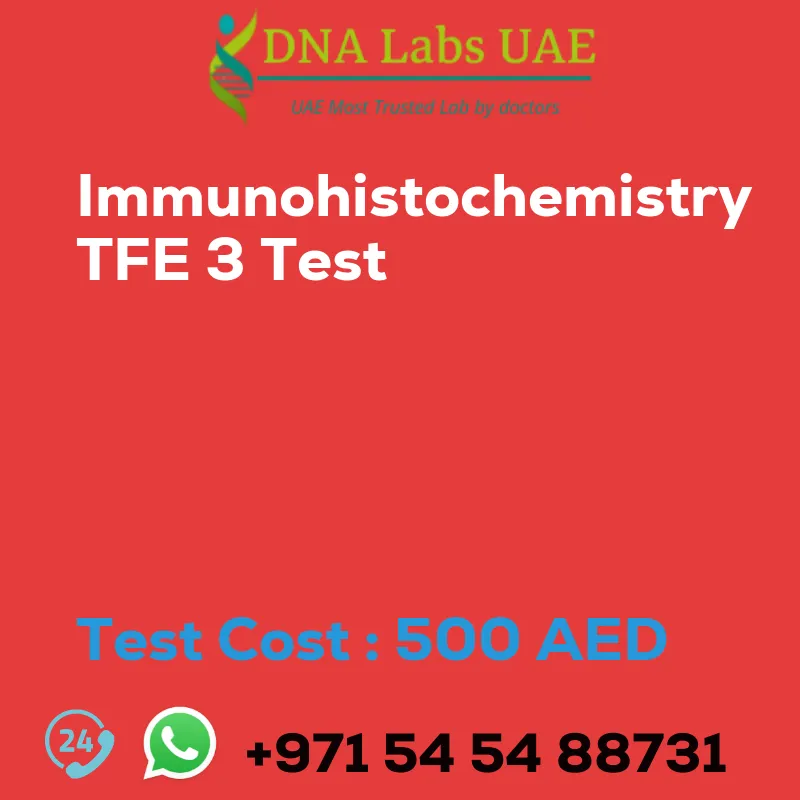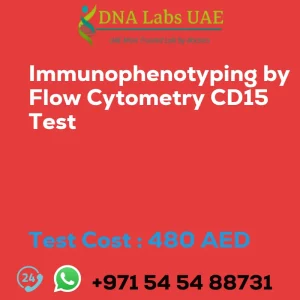IMMUNOHISTOCHEMISTRY TFE 3 Test
Cost: AED 500.0
At DNA Labs UAE, we offer the IMMUNOHISTOCHEMISTRY TFE 3 Test at a cost of AED 500.0. This test is used for diagnosing cancer and is performed using immunohistochemistry (IHC) method.
Test Components
- Test Name: IMMUNOHISTOCHEMISTRY TFE 3 Test
- Price: 500.0 AED
Sample Condition
To perform the test, please submit tumor tissue in 10% Formal-saline or Formalin fixed paraffin embedded block. The sample should be shipped at room temperature. Additionally, provide a copy of the Histopathology report, site of biopsy, and clinical history.
Report Delivery
The sample will be analyzed daily, and the report will be delivered within the following timelines:
- Report Block: 5 days
- Tissue Biopsy: 5 days
- Tissue large complex: 7 days
Method
The IMMUNOHISTOCHEMISTRY TFE 3 Test is performed using immunohistochemistry (IHC) method.
Test Type
The test is used for diagnosing cancer.
Doctor
The test is conducted under the supervision of an Oncologist and Pathologist.
Test Department
The test is conducted in the Histology department.
Pre Test Information
Before undergoing the test, please provide a copy of the Histopathology report, site of biopsy, and clinical history.
Test Details
The TFE3 test is an immunohistochemistry (IHC) test that detects the presence of the TFE3 protein in tissue samples. TFE3 is a transcription factor that plays a role in cell growth and differentiation. Abnormal expression or fusion of the TFE3 gene has been associated with certain types of cancer, such as renal cell carcinoma and alveolar soft part sarcoma.
The TFE3 IHC test involves staining tissue sections with antibodies specific to the TFE3 protein. These antibodies bind to the TFE3 protein if it is present in the tissue sample. The stained tissue sections are then examined under a microscope to determine the presence and location of the TFE3 protein.
The TFE3 IHC test is often used as a diagnostic tool to differentiate between different types of tumors and guide treatment decisions. It can also be used to monitor the effectiveness of targeted therapies that specifically target the TFE3 protein.
It is important to note that the TFE3 IHC test is just one component of a comprehensive diagnostic evaluation. Other tests, such as genetic testing or molecular analysis, may be necessary to confirm a diagnosis and guide treatment decisions.
| Test Name | IMMUNOHISTOCHEMISTRY TFE 3 Test |
|---|---|
| Components | |
| Price | 500.0 AED |
| Sample Condition | Submit tumor tissue in 10% Formal-saline OR Formalin fixed paraffin embedded block. Ship at room temperature. Provide a copy of the Histopathology report, Site of biopsy and Clinical history. |
| Report Delivery | Sample Daily by 6 pm; Report Block: 5 days Tissue Biopsy: 5 days Tissue large complex : 7 days |
| Method | Immunohistochemistry |
| Test type | Cancer |
| Doctor | Oncologist, Pathologist |
| Test Department: | HISTOLOGY |
| Pre Test Information | Provide a copy of the Histopathology report, Site of biopsy and Clinical history. |
| Test Details |
The TFE3 test is an immunohistochemistry (IHC) test that is used to detect the presence of the TFE3 protein in tissue samples. TFE3 is a transcription factor that plays a role in cell growth and differentiation. Abnormal expression or fusion of the TFE3 gene has been associated with certain types of cancer, such as renal cell carcinoma and alveolar soft part sarcoma. The TFE3 IHC test involves staining tissue sections with antibodies specific to the TFE3 protein. These antibodies bind to the TFE3 protein if it is present in the tissue sample. The stained tissue sections are then examined under a microscope to determine the presence and location of the TFE3 protein. The TFE3 IHC test is often used as a diagnostic tool to help differentiate between different types of tumors and to guide treatment decisions. It can also be used to monitor the effectiveness of targeted therapies that specifically target the TFE3 protein. It is important to note that the TFE3 IHC test is just one component of a comprehensive diagnostic evaluation. Other tests, such as genetic testing or molecular analysis, may be necessary to confirm a diagnosis and guide treatment decisions. |








